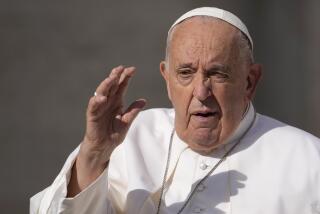Can Gays Be Good Priests?
Catholic tradition holds that God can find good even in the most profound evil. Great evil has apparently been lurking in the church for a while, so God may have his work cut out for him. Yet the outlines of good are beginning to emerge.
After having been taken to the Vatican woodshed, the American cardinals, “in communion with the Holy Father,” minced no words in finding child abuse to be “rightly considered a crime by society and an appalling sin” to be promptly reported to civil authority.
The larger issue, which was not addressed, is homosexuality and the priesthood. On this, the cardinals’ communique was largely silent, other than to note that “almost all the cases involved adolescents and therefore were not cases of true pedophilia.” True enough, but therein lies the real issue: how to reassure the faithful of proper priestly behavior when it is largely unknown whether or, more realistically, how many priests are gay.
Catholic teaching maintains that homosexuals do not choose their orientation, as “its psychological genesis remains largely unexplained,” according to the 1994 “Catechism of the Catholic Church.” For this reason and the even more basic belief that all of us are created in God’s image, these persons must be “accepted with respect, compassion and sensitivity.” Yet while decrying any form of “unjust discrimination,” the church posits that homosexuals must remain chaste.
No entity in society has fully come to terms with this combination of beliefs. To avoid unjust discrimination, some government entities have sought to simply add sexual orientation to fair housing, employment and other civil rights laws. This, however, is a problem for those who do not want the law to be understood as explicitly or implicitly affirming homosexual practice.
Colorado voters thought they could solve the dilemma in 1992 by forbidding local governments from adding sexual orientation to civil rights laws. The Supreme Court sent that effort at direct democracy into the dustbin.
On the other hand, federal courts largely have accepted President Clinton’s “don’t ask, don’t tell” policy for the military. Some people contend that this unjustly excludes celibate but frank homosexuals from national service.
Now, it may be that the human personality is incapable of the perfection of chastity that the Catholic Church promotes. Cardinal Anthony Bevilacqua of Philadelphia has not only been one of the strongest proponents of “zero tolerance” for priests with a history of child abuse but also has proposed that “a person who is homosexually oriented is not a suitable candidate for the priesthood, even if he has never committed any homosexual act.” The cardinal reasons that, for a person with a homosexual orientation, the “risks” of being unchaste in the male-dominated priestly life “may be too high.”
The Bevilacqua statement deserves serious and respectful thought. The cardinal himself acknowledges, however, that there probably are homosexually oriented priests who have scrupulously observed their obligation to remain chaste. Though a celibate heterosexual who enters the seminary and refrains from sexual activity can be said to be giving up the moral good of family and marriage and a chaste homosexual has forgone only a moral wrong, is it not the same prayerful, total gift to God?
Could the candid discussion of these matters be the greater good that God has planned to arise out of the present scandal? There has been much clamoring to end priestly celibacy--the giving of an “undivided heart to the Lord.” But could it be that God intends the reaffirmation of this practice to signal the renewed and open welcome of heterosexual and homosexual priest alike, so long as both are living faithfully within that vow?
More to Read
Sign up for Essential California
The most important California stories and recommendations in your inbox every morning.
You may occasionally receive promotional content from the Los Angeles Times.










